Gestational Surrogacy in Vermont: A Comprehensive Guide
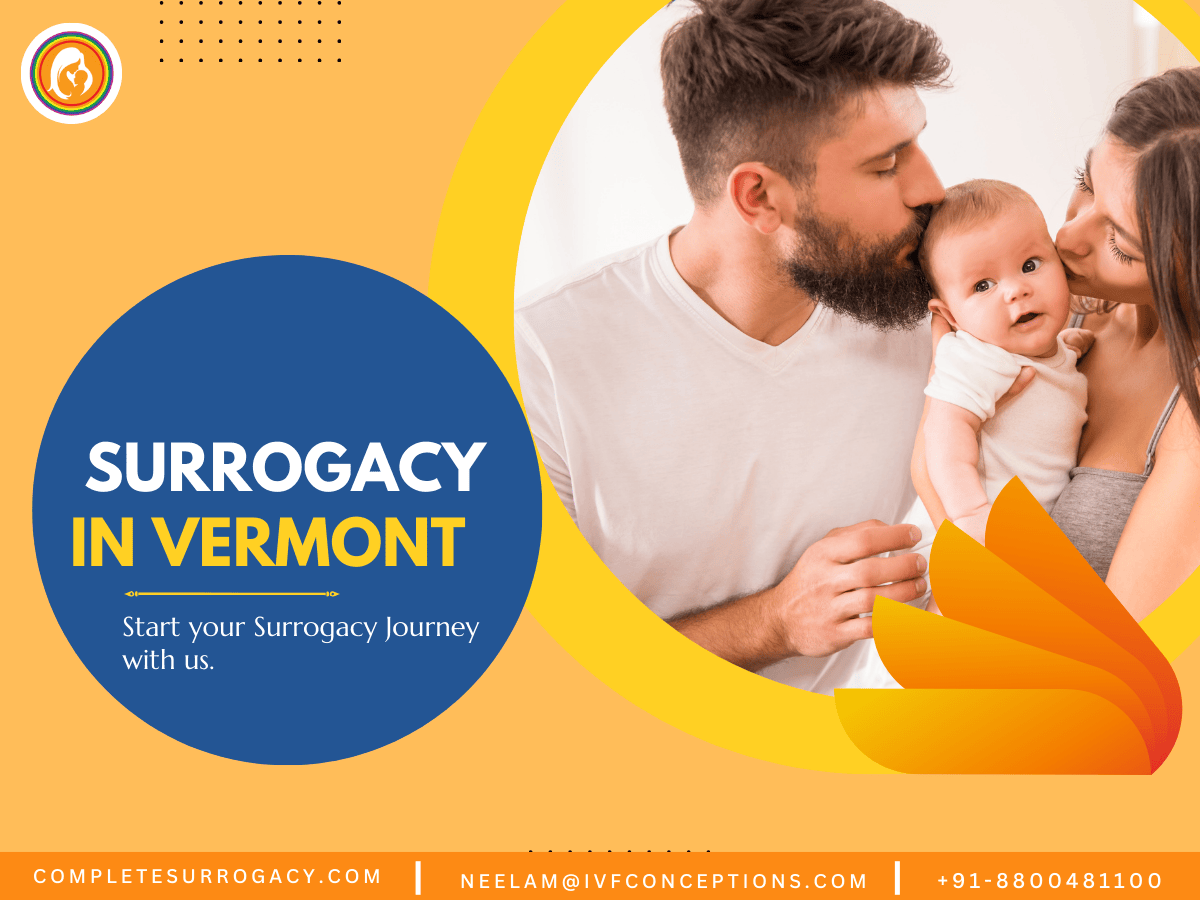
Gestational Surrogacy in Vermont offers a legally secure and well-regulated path to parenthood for intended parents. Vermont is considered one of the most surrogacy-friendly states in the U.S., providing a clear legal framework that protects both intended parents and surrogates.
For those exploring surrogacy in Vermont, understanding the Vermont surrogacy laws is essential. The state allows pre-birth parentage orders, ensuring that intended parents are recognized as the legal parents of the child from birth. This makes Vermont an attractive option for individuals and couples seeking a smooth and legally protected surrogacy process.
Get in touch for a Free Surrogacy Consultancy:
📲 +91-8800481100 ( WhatsApp, Line, Viber)
Whether you are an intended parent or a surrogate, consulting with a Vermont surrogacy attorney can help navigate the legalities and ensure a seamless experience.
Additional guide for intended parents:
Overview of Gestational Surrogacy in Vermont
Vermont, like several states, does not have explicit surrogacy regulations governing family formation methods. Nevertheless, the legal framework is generally supportive of surrogacy arrangements, allowing both intended parents and surrogates to pursue their options with the guidance of experienced surrogacy professionals.
Commercial surrogacy is legally permissible in Vermont; however, it is advisable to obtain legal counsel tailored to your unique surrogacy journey. It is important to note that Vermont law regards gestational surrogacy similarly to adoption, which may affect base compensation for surrogates and impose strict regulations on the termination of parental rights upon childbirth.
Given that Vermont neither explicitly sanctions nor prohibits surrogacy arrangements, the legality and enforceability of surrogacy contracts can be ambiguous.
Intended parents using their gametes or married and unmarried couples leveraging donor gametes are eligible for post-birth parentage declarations.
However, if a single parent or a couple with no genetic ties to the child is involved, courts may not issue a parentage order without an adoption proceeding following the birth. Second-parent adoption is permissible, yet unmarried couples must complete a home study before adoption can proceed.
On the other hand, married intended parents who cannot obtain a post-birth order may pursue a stepparent adoption, circumventing the home study requirement. Using donor gametes does not impede the chance of securing a parentage order, provided one parent has a genetic link.
Nevertheless, intended parents using donated embryos cannot obtain such an order due to the absence of genetic connection. It is prudent for those considering embryo donation to consult a local surrogacy attorney regarding associated legal obligations. Vermont’s laws equally protect LGBTQ surrogacy participants, ensuring equal treatment within the surrogacy process in Vermont.
Surrogacy Laws in Vermont
The emotional and significant experience of surrogacy embodies hope and joy for all involved. Familiarity with Vermont’s surrogacy laws is vital for anyone considering this journey.
Vermont is recognized for its pro-surrogacy climate, wherein gestational surrogacy agreements are permitted under state regulations, even though the surrogate has no genetic ties to the child.
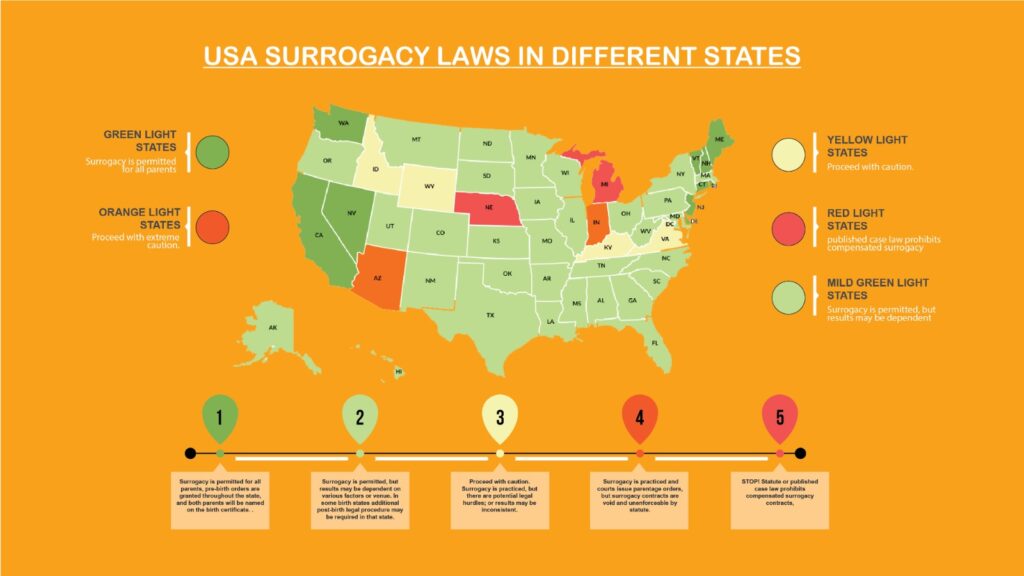
Gestational Carrier Agreements and Vermont Surrogacy Laws
The Vermont Parentage Act of 2018 explicitly acknowledges gestational surrogacy while omitting traditional surrogacy. Under Vermont law (15C V.S.A. 802), gestational carrier arrangements are legal, conditioned upon specific criteria.
For instance, the surrogate must be at least twenty-one and should have her own legal representation (15C V.S.A. 801). The gestational surrogacy agreement must be documented in writing, signed by all parties, and executed before any medical procedures commence.
Pre-Birth Parentage Orders
Pre-birth orders play an essential role in facilitating the surrogacy process in Vermont. This legal instrument ensures that the names of the intended parents appear on the birth certificate upon the child’s birth, thus streamlining the transition of parental rights and responsibilities.
Vermont courts are authorized to issue pre-birth orders in accordance with the legal framework established (15C V.S.A. 708, 804).
Vermont Laws on Egg and Sperm Donation
Vermont law (15C V.S.A. 702) stipulates that sperm, egg, and embryo donors retain no parental rights over children conceived through assisted reproductive technologies. However, if a donor provides gametes to their spouse, they are considered the legal parent of the resulting child.
Second-Parent and Stepparent Adoption Law in Vermont
Vermont law permits stepparents to adopt their spouse’s children under certain conditions, such as cohabitation for six months prior to adoption proceedings and sole physical custody by the biological parent (15A V.S.A. 4-101).
In cases of joint custody, the child must have predominantly lived with the stepparent during the previous twelve months.
Cost of Surrogacy in Vermont
The cost of surrogacy in Vermont can vary widely depending on factors such as the agency, surrogate compensation, medical procedures, and legal requirements.

On average, surrogacy in Vermont can cost between $80,000 and $150,000 or more.
Here is a detailed breakdown of the expenses typically involved:
1. Surrogate Compensation
- Base Compensation: $30,000–$50,000, depending on the surrogate’s experience and the arrangement.
- Additional Payments:
- Maternity clothing allowance
- Monthly allowances during the pregnancy
- Compensation for invasive procedures (e.g., C-section)
2. Medical Costs
- Fertility Treatments: $10,000–$30,000 for IVF procedures, egg retrieval, and embryo transfers.
- Prenatal Care and Delivery: $10,000–$20,000 depending on the surrogate’s insurance and healthcare provider.
- Surrogate Health Insurance: If the surrogate’s health insurance does not cover surrogacy, a specialized policy may cost $5,000–$10,000.
3. Legal Fees
- Contract Drafting: $5,000–$8,000 to ensure all agreements between intended parents and the surrogate are legally binding.
- Parentage Orders: $2,000–$5,000 for obtaining pre- or post-birth parentage orders.
- Surrogate’s Legal Counsel: $2,000–$4,000 to ensure independent legal representation for the surrogate.
4. Agency Fees
- Surrogacy Agency Fees: $20,000–$40,000 for matching intended parents with a surrogate and providing support throughout the process.
- Support Services: This may include counseling, administrative tasks, and coordination.
5. Other Costs
- Screening Costs: $1,000–$3,000 for psychological and medical evaluations of the surrogate.
- Travel Expenses: $1,000–$5,000 for travel to medical appointments or court hearings.
- Miscellaneous Expenses: Including daycare for the surrogate’s children, lost wages, or additional unforeseen costs.
Typical average cost of surrogacy Comparison
| Expense | Low Estimate | High Estimate |
| Surrogate Compensation | $30,000 | $50,000 |
| Medical Costs | $20,000 | $50,000 |
| Legal Fees | $9,000 | $17,000 |
| Agency Fees | $20,000 | $40,000 |
| Insurance and Miscellaneous | $10,000 | $20,000 |
| Total Estimated Cost | $80,000 | $150,000+ |
Factors Influencing Surrogacy Costs
- Surrogate’s Experience: Experienced surrogates may request higher compensation.
- Insurance Coverage: If the surrogate has existing insurance that covers surrogacy, costs may decrease.
- Legal Complexity: Unique family structures or complex arrangements may require additional legal steps.
- Medical Challenges: Additional procedures such as multiple embryo transfers or complications during pregnancy can increase costs.
- Altruistic vs. Commercial Surrogacy: Altruistic surrogacy (e.g., using a family member) can reduce costs by eliminating compensation fees.
Tips to Manage Surrogacy Costs
- Work with experienced surrogacy agencies in Vermont for transparent pricing.
- Consider financing options or payment plans offered by agencies or clinics.
- Consult with a surrogacy attorney early to avoid unexpected legal expenses.
- Obtain a detailed estimate of medical and insurance costs from your fertility clinic.
Gestational Surrogacy in Vermont for Intended Parents
For families facing challenges with conception, surrogacy presents a promising pathway to fulfillment and new beginnings. In Vermont, gestational surrogacy is the predominant model, facilitating the use of donor gametes or the genetic material of the intended parents through IVF to create an embryo.
The surrogate carries and delivers the child, ensuring a seamless custody transfer, underpinned by Vermont’s favorable legal provisions ensuring immediate recognition of the intended parents’ rights.
This supportive legal environment has made Vermont an attractive choice for intended parents.
How does surrogacy process works in Vermont?
Understanding the intricate steps involved in the surrogacy process is crucial for both intended parents and surrogates.
The surrogacy process takes 18 months to 24 months depending upon the individual circumstances
Outlines the surrogacy process timeline for intended parents:
| Stage | Description of Stage | Duration |
| Research Phase | Explore family building options and decide on surrogacy. | Personal timeframe |
| Consultation and Application | Choose a surrogacy agency, sign agreement, and start embryo creation (if needed). | 1-3 Months |
| Matching | Agency finds and presents potential gestational carriers. Meet and decide on a match. | 3-6 Months |
| Medical Screening and Contracts | Carrier undergoes medical and psychological screening. Sign surrogacy contract. | 1-2 Months |
| Embryo Transfer | Prepare for embryo transfer. Success may take multiple attempts. | 1-1.5 Months |
| Pregnancy | Gestational carrier’s pregnancy, approximately 40 weeks. | 9-10 Months |
| Birth and Postpartum | Baby’s birth, establish parental rights, and postpartum period. | 1.5-3 Months |
Please keep in mind that the durations mentioned in the table are approximate and can vary depending on individual circumstances and other factors. Always consult with a reputable surrogacy agency or professional to get personalized guidance throughout the surrogacy journey.
Here is the outlines the following essential phases:
1. Initial Consultation: Educational sessions addressing inquiries and providing guidance.
2. Surrogate Matching: Careful pairing of surrogates and intended parents based on compatibility.
3. Legal Contracts: Comprehensive legal protections for both parties facilitated by experienced legal professionals.
4. Medical Procedures: Coordination of IVF processes and embryo transfers by leading medical specialists.
5. Pregnancy Support: Continuous support and resources for intended parents and surrogates throughout the pregnancy journey.
6. Birth and Beyond: Assistance with legal and administrative tasks to ensure a smooth final transition upon receipt of the parentage order.
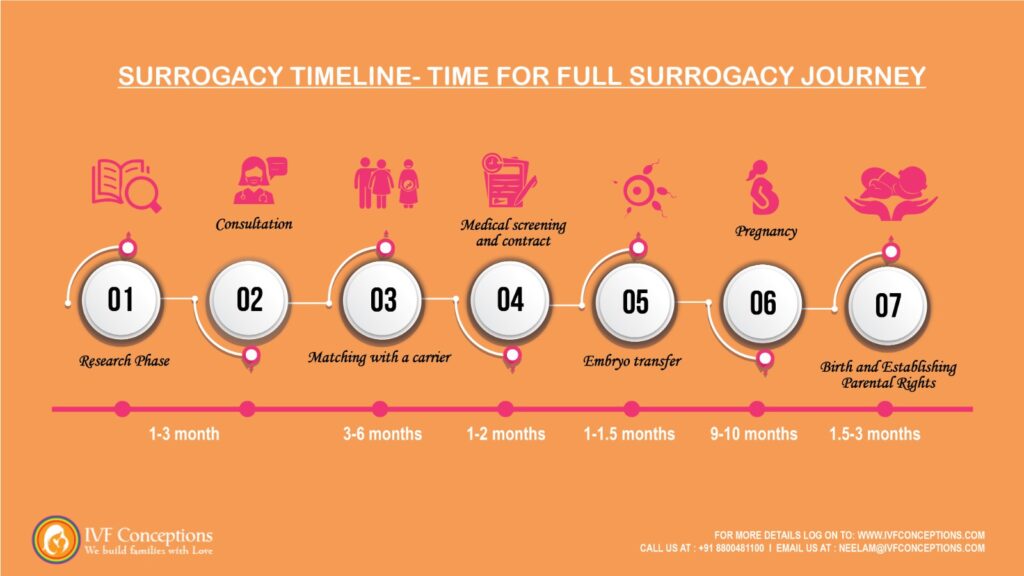
Finding a Surrogate Mother in Vermont
The role of a surrogate mother is pivotal, as she carries and delivers a child for another individual or couple. To qualify as a surrogate in Vermont, candidates must generally meet the following criteria:
– Age Requirements: Between 21 and 40 years old.
– Healthy BMI: Maintaining a body mass index within a healthy range.
– Prior Experience: Successfully completing at least one previous pregnancy and delivery.
– Smoke-Free Environment: Living in a smoke-free environment without tobacco use.
– Evaluations: Completing thorough physical and psychological assessments.
Potential avenues for locating a surrogate mother include:
– Fertility Clinics: Many clinics offer internal surrogacy programs or referrals to qualified surrogates within their network.
– Online Surrogacy Platforms: Various websites and forums host profiles of potential surrogates.
– Surrogacy Agencies: Specialized agencies focus on connecting intended parents with surrogate mothers, managing legal and medical processes.
– Online Communities: Engaging with social media groups and classified ads focused on surrogacy can facilitate connections with potential surrogates.
– Altruistic Surrogacy: Friends or family members may volunteer to become surrogates in a process characterized by trust and familiarity.
Top Affordable Surrogacy Destinations- Cheapest Countries for Surrogacy
Below is a look at some of the most cost-effective international surrogacy destinations, including their processes, costs, legal frameworks, and eligibility criteria.
1. Surrogacy in Mexico
- Surrogacy Process: Surrogacy in Mexico is mostly unregulated, except in specific states like Tabasco, where arrangements are managed through private agreements with clinics.
- Cost Range: The typical cost of surrogacy in Mexico ranges from $60,000 to $80,000.
- Legal Framework: Surrogacy is limited to heterosexual married couples or single parents, depending on the state.
- Eligibility Criteria: Legal contracts are mandatory, and intended parents should collaborate with experienced lawyers to ensure enforceability.
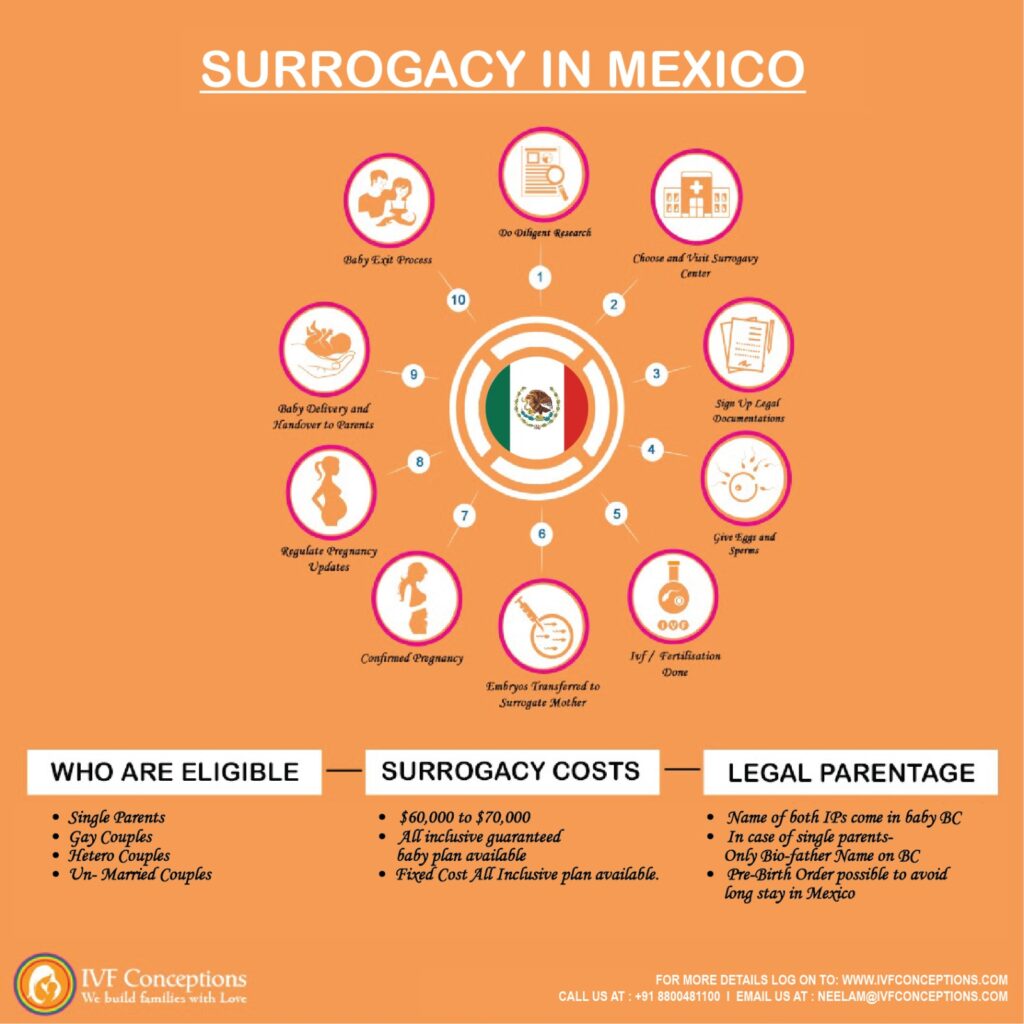
2. Surrogacy in Colombia
- Surrogacy Process: Altruistic surrogacy is permitted in Colombia, supported by legally binding contracts and access to affordable IVF treatments.
- Cost Range: The cost of surrogacy in Colombia generally ranges between $60,000 and $70,000.
- Legal Framework: Surrogacy is available to heterosexual couples and single parents.
- Eligibility Criteria: There are no citizenship requirements, but contracts must adhere to Colombian legal standards.
3. Surrogacy in Georgia (country)
- Surrogacy Process: Georgia has clear and established surrogacy laws, ensuring that agreements are legally binding.
- Cost Range: The total cost of surrogacy in Georgia typically falls between $50,000 and $70,000.
- Legal Framework: Surrogacy is restricted to heterosexual married couples, with parental rights granted solely to the intended parents.
- Eligibility Criteria: Couples must provide a marriage certificate proving at least one year of partnership.
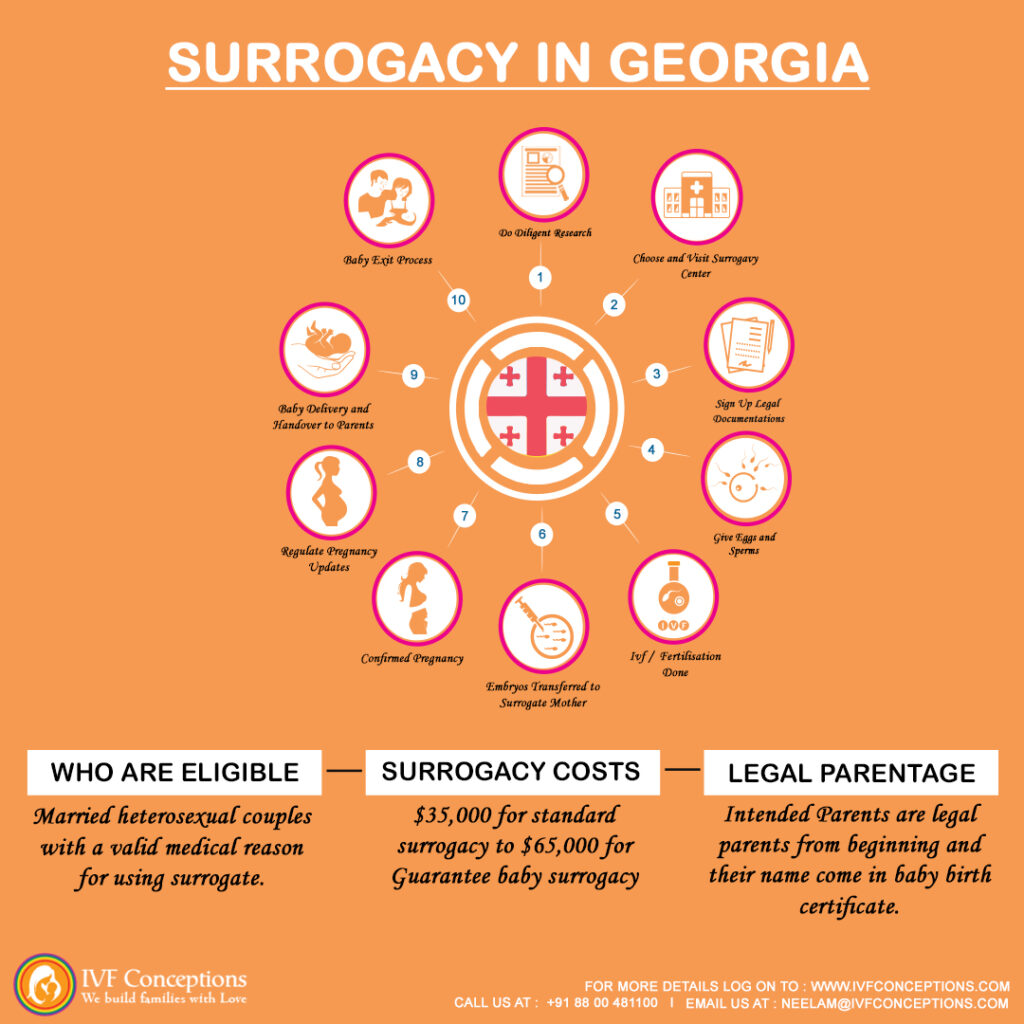
4. Surrogacy in Ukraine
- Surrogacy Process: Previously a favored destination, Ukraine offered transparent procedures and robust legal protections before the geopolitical crisis.
- Cost Range: Surrogacy costs in Ukraine typically range from $50,000 to $70,000.
- Legal Framework: Surrogacy is restricted to heterosexual married couples, with surrogates having no parental rights.
- Eligibility Criteria: Intended parents must be married heterosexual couples and provide proof of medical necessity for surrogacy.
5. Surrogacy in Armenia
- Surrogacy Process: Armenia offers legal certainty through its surrogacy laws, making it an increasingly popular choice for intended parents.
- Cost Range: Surrogacy in Armenia typically costs between $50,000 and $70,000.
- Legal Framework: Surrogacy is available exclusively to heterosexual married couples.
- Eligibility Criteria: Couples must be married, and the female partner must be under the age of 53.
6. Surrogacy in Argentina
- Surrogacy Process: Altruistic surrogacy is common, though contracts are not legally enforceable. Intended families collaborate closely with surrogates and clinics.
- Cost Range: The typical cost of surrogacy ranges from $50,000 to $70,000.
- Legal Framework: While there are no explicit surrogacy laws, it is recognized under family law and open to all family types, including LGBTQ+ couples.
- Eligibility Criteria: Working with legal experts is essential to navigate the informal surrogacy framework effectively.
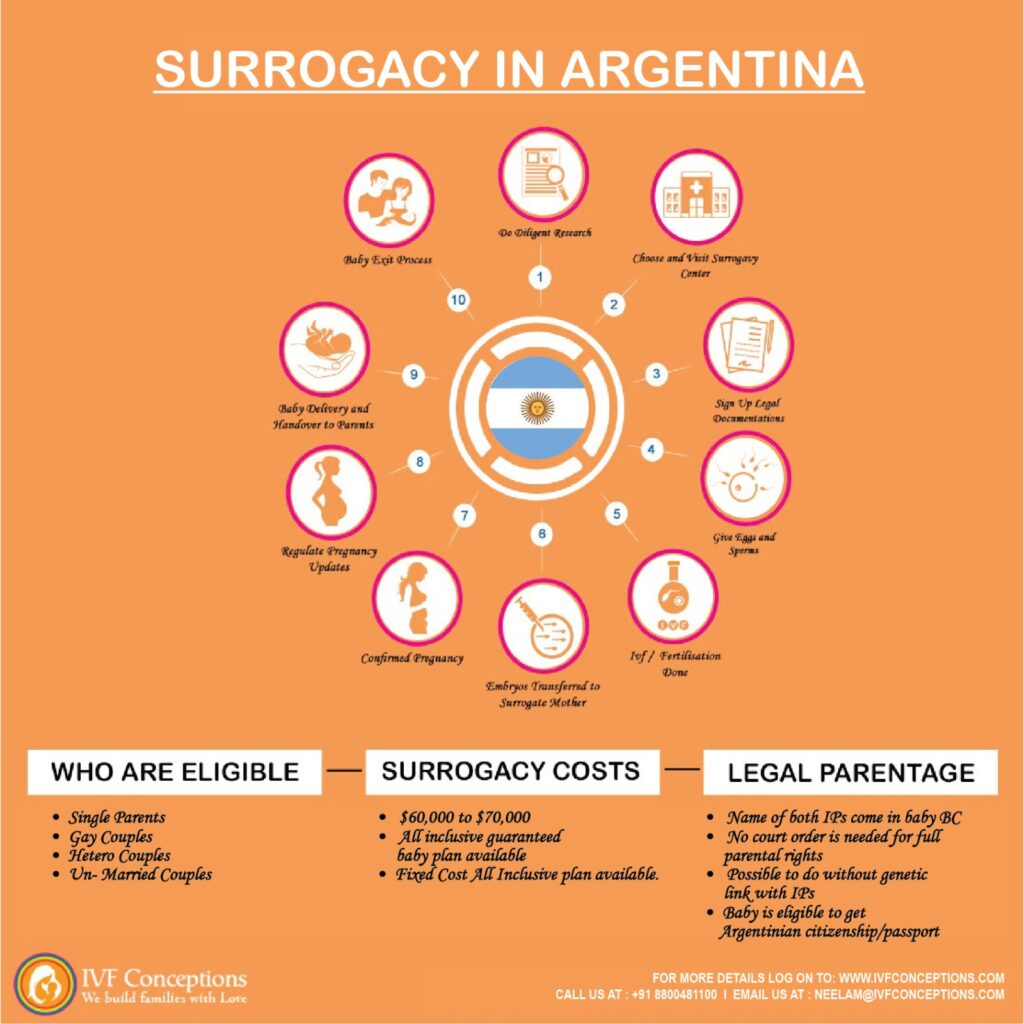
7. Surrogacy in India
- Surrogacy Process: India has reopened surrogacy exclusively for Indian citizens, focusing solely on altruistic arrangements.
- Cost Range: The cost of surrogacy in India typically ranges from $25,000 to $40,000.
- Legal Framework: Surrogacy is limited to heterosexual married Indian couples, NRI, or OCI cardholders who meet specific conditions. Commercial surrogacy is strictly prohibited.
- Eligibility Criteria: Intended parents must hold Indian citizenship, NRI, or OCI status and provide medical documentation demonstrating the need for surrogacy.
Comparative Table: Surrogacy Costs in the USA and Surrogacy Abroad Countries
| Country | Cost Range | Legal Framework | Eligibility Criteria | Key Feature |
| USA | $120,000–$200,000 | Fully regulated, binding | Open to all family types | High-quality medical and legal services |
| Mexico | $60,000–$80,000 | Semi-regulated, binding in parts | Heterosexual married couples, singles | Lower costs and proximity for Americans |
| Colombia | $50,000–$70,000 | Binding legal contracts | Open to heterosexual couples, singles | Affordable and accessible IVF treatments |
| Georgia | $40,000–$60,000 | Strict legal framework | Heterosexual married couples | Strong legal protection |
| Ukraine | $40,000–$70,000 | Strict legal framework | Heterosexual married couples | Transparent and reliable processes |
| Armenia | $50,000–$70,000 | Strong legal protections | Heterosexual married couples | Growing popularity with legal certainty |
| Argentina | $40,000–$60,000 | Informal, family law-based | Open to all family types | LGBTQ+ friendly with affordable options |
| India | $25,000–$40,000 | Strict, altruistic only | Indian citizens only | Most affordable option for eligible parents |
Looking for “best” Surrogacy clinic / Surrogacy agency abroad?
We are here to help with more than 15 years of experience in offering safe, reliable and affordable surrogacy options globally.
We analyze your needs, budget planning, egg donor availability, destination preferences with legal framework and find top surrogacy country and agencies for you!
Our consulting services are free of cost and do not affect your costing in any way but help you to save tons of research time and money.
Additional guide for intended parents:
Conclusion
In summary, surrogacy in Vermont offers a legally viable and profoundly rewarding option for individuals and couples wishing to expand their families. Vermont, similar to many other jurisdictions, recognizes and supports surrogacy.
To ensure that the process embodies compassion and integrity for all participants, it is crucial to approach ethical surrogacy with careful consideration.
Sustaining surrogacy as a constructive and ethical choice for family formation is essential for continued dialogue and thoughtful regulation.
Our Complete Surrogacy Consulting Services /Case Management cover a wide range of services globally, including:
✓ Guide and Support to choose the secure and legal surrogacy program
✓ Surrogacy clinic and agency recommendations
✓ Legal support and referrals
✓ Logistic support/planning
✓ Surrogacy agency liaison
✓ Financial planning/financial aids
✓ Citizenship and passport assistance
✓ Case management
✓ Shipment assistance
✓ Collaborations with third-party support (if you have your own clinic/agency to make sure your program is done properly)
✓ Quick and transparent communication
At COMPLETE SURROGACY our goal is to ensure a affordable, reliable, smooth and supportive experience as you start this remarkable journey towards parenthood. If there are any specific questions, concerns, or details you’d like to discuss, please don’t hesitate to let me know.
We are happy to assist you with one of our global surrogacy programs best suited you your personal and legal needs. I am here to assist you every step of the way
Get in touch for a Free Surrogacy Consultancy:
📲 +91-8800481100 ( WhatsApp, Line, Viber)

Frequently Asked Questions About Surrogacy in Vermont
1. What is gestational surrogacy in Vermont?
Gestational surrogacy in Vermont involves a woman carrying a pregnancy for intended parents using an embryo created through in vitro fertilization (IVF), with no genetic ties to the resulting child.
2. Is surrogacy legal in Vermont?
Yes, surrogacy is legal in Vermont and is governed by the Vermont Parentage Act, which delineates the rights and responsibilities of intended parents and surrogates throughout the surrogacy process.
3. What steps are involved in the surrogacy process in Vermont?
The surrogacy process in Vermont typically includes partnering with a reputable agency or attorney, finalizing a surrogacy contract, undergoing medical assessments, matching with a gestational surrogate, and addressing the legal aspects such as obtaining pre-birth orders.
4. Can traditional surrogacy occur in Vermont?
Traditional surrogacy—where the surrogate is genetically related to the child—remains less common and more legally intricate than gestational surrogacy. Consultation with a qualified surrogacy attorney is recommended to better understand the legal implications associated with traditional surrogacy in Vermont.
Disclaimer:
All legal information on this website is intended only as a guide and is not a replacement for the opinions of licensed legal professionals/Medical professionals. Some information may have changed since the time of publication. We advise you to consult a licensed attorney/Medical expert with authority in fertility/surrogacy processes.

Author Bio: Neelam Chhagani is an International Surrogacy Expert with 15 years of experience in the fertility and surrogacy domain. As the founder of IVF Conceptions and Complete Surrogacy, she has guided over 4,000 intended parents worldwide on their surrogacy journey to parenthood. Recognized as a trusted authority, she specializes in holistic infertility solutions and third-party reproduction consulting.
Holding an MA in Counselling Psychology and a PGD in Mental Health, Neelam is a proud member of the European Fertility Society (EFS) and the European Society of Human Reproduction and Embryology (ESHRE). She is also a leading surrogacy blogger, providing valuable insights into ethical and practical surrogacy solutions.
Since 2010, committed to supporting ALL family types, Neelam has been passionate about helping intended parents grow their families with compassion, integrity, and a focus on secure and affordable surrogacy options Globally.
Learn more about Neelam:
https://www.ivfconceptions.com/neelam-chhagani-surrogacy-consultant/
https://www.linkedin.com/in/neelam-chhagani-92892229/
https://www.quora.com/profile/Neelam-Chhagani















I was introduced to Neelam by a friend who worked with Neelam for surrogacy. Neelam is absolutely wonderful. I am a single male and the journey to fatherhood is not that easy. Neelam connected me to a program ideal for my circumstances. She was with me throughout the pregnancy providing advice and guidance along the way. I am so grateful I found her and am thrilled today that I have a beautiful daughter. I highly recommend Neelam to anyone who is on a journey to become a parent. Having a child has changed my world for the better. I wish others success with their own journey and recommend you connect with Neelam to find a path that is best for you.
SA (USA)